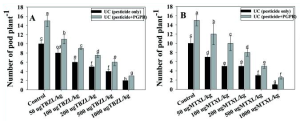A group from Department of Biology, College of Science and Humanities, Prince Sattam Bin Abdulaziz University, Al-Kharj 11492 Saudi Arabia, etc. has reported about potential of pesticide-tolerant Pseudomonas sp. to promote plant growth under pesticides stress.
https://www.ncbi.nlm.nih.gov/pmc/articles/PMC9200474/
Agricultural output has risen in the last four decades, owing to increased use of synthetic chemical fertilizers, and pesticides including fungicides. To meet the increased need for food, chemical fertilizers and pesticides have surely polluted the environment and harmed soil creatures and insect pollinators. Furthermore, over-utilization of chemical inputs has made crops more prone to disease and reduced soil fertility.
Plant growth is influenced positively by plant growth-promoting rhizobacteria (PGPR) due to the generation of phytohormones, improved phosphorus availability, and the expansion of plant root systems to absorb more water and nutrients. A few soil bacteria demonstrate pesticide resistance after prolonged exposure, and they can be employed to efficiently remediate pesticide-polluted areas. Their ability to break down pesticides is significantly important in allowing harmful chemicals to be removed from the environment and pollution to be controlled.
Pesticide tolerance was tested by growing the isolates in different concentrations of fungicide (CBZM, TBZL and MTXL) treated minimal salt agar (MSA) medium. Among the isolates from rhizosphere of Vigna radiata, Pseudomonas sp. PGR-11 was the only rhizobacterial isolate to survive up to 800, 1600 and 1200 μg/mL of each of CBZM, TBZL and MTXL, respectively. Pseudomonas sp. PGR-11 was specifically selected due to its highest ability to tolerate the tested fungicides and its maximum production of PGP substances (siderophores, IAA, EPS, HCN and ammonia).
The yield attributes of V. radiata exhibited a substantial decline with increasing concentrations of both test pesticides. For example, with 1000 μg MTXL kg−1 soil, the number of pods, yield of pods, number and yield of seeds, and protein content of V. radiata were maximally decreased by 90, 78, 85, 82 and 69%, respectively, compared to un-inoculated. However, following soil inoculation with Pseudomonas sp. PGR-11 into plants, all these parameters were significantly increased as shown below.

